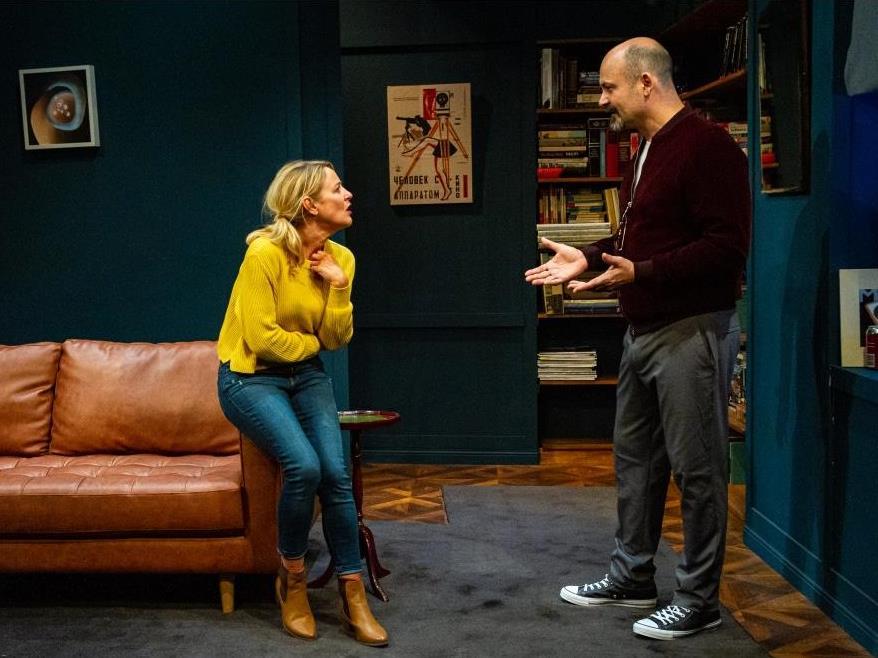Sarah Sutherland and Steve Bastoni in Ulster American. Image: Teresa Noble.
Ulster American makes for some very uncomfortable viewing. And this is partly the point. No matter how sure you are of your convictions, no matter how nuanced you feel your political persuasions, it is not easy to find solid footing here.
The play opens in the living room of London theatre director Leigh Carver (David Whiteley), where he and American Oscar winner Jay Conway, the lead in Carver’s upcoming play (Steve Bastoni), sit discussing why – in this post-Brexit, post-#MeToo political climate – it is more important than ever that these two avowed feminists make the play they’re about to make. It is this conversation which lays the groundwork for the next 60 minutes of increasing tension and conflict: what is it that men feel comfortable to say in the company of each other that they wouldn’t say when a woman is present? How do people, even sympathetic and honourable people, which arguably both or neither of these men are, betray their values and prejudices when alone?
Bastoni throughout is remarkable: utterly unlikeable, slimy, conceited, absurd, somehow able to make this larger than life mockery of manhood seem completely believable; I’m sure all the woman in audience have met at least one. Whiteley’s performance is nuanced and very funny. Clearly uncomfortable with the blustering machismo of his leading man, he has nonetheless decided to coddle and placate him; he would be almost sympathetic if he weren’t so spineless.
When the playwright, Ruth Davenport (played expertly by Sarah Sutherland), arrives and declares that not only is she not Catholic but she’s actually not even Irish, despite being from Northern Ireland, the tension slowly gets ratcheted up. As the stakes rise, the men slowly come to betray their political ambivalences.
The script is expertly crafted, delighting in mocking the hypocrisy of uninterrogated identity politics: while the playwright is a woman, she is also pro-union, pro-conservative and pro-Brexit, in direct opposition to every political ideal Carver holds. It’s easy to defend the voices of women or any minority when those opinions merely parrot your own – it’s when they differ that your values are meaningfully tested. The script also takes issue with pure identitarian politics, as despite being a British citizen, having studied in England, working in England and identifying as British, Davenport cannot shake the title of Irish, while Conway, a man who has never been to Ireland, is referred to constantly as an Irish American. Of course the distinction is not about self-identification at all but about the political biases that extend beyond identity, a question that the play is content to destabilise rather than answer. The project of the play is not easy resolutions but disruption.
The set design and blocking of the play are a credit to designer Louise McCarthy and director Brett Cousins. And despite the discomfort, there are some genuinely hilarious moments which offer some respite from the awkwardness. Dwelling in this social awkwardness, where power is unequally distributed and men are not used to being told ‘no’, is a chore we all need to spend some doing so that next time we find ourselves confronted with a bully like Conway, we can behave better than the characters in Ulster American.
4 stars out of 5 ★★★★
Ulster American
By David Ireland
Directed by Brett Cousins
Set & costume design: Louise McCarthy
Lighting design: Tom Willis & Rachel Lee
Sound design: Daniel Nixon
Accent coach: Matt Furlani
Fight director: Charlie Mycroft
Featuring Steve Bastoni, Sarah Sutherland & David Whiteley
25 August-19 September 2019
Red Stitch Actors’ Theatre, St Kilda East VIC
Tickets $29-$55





